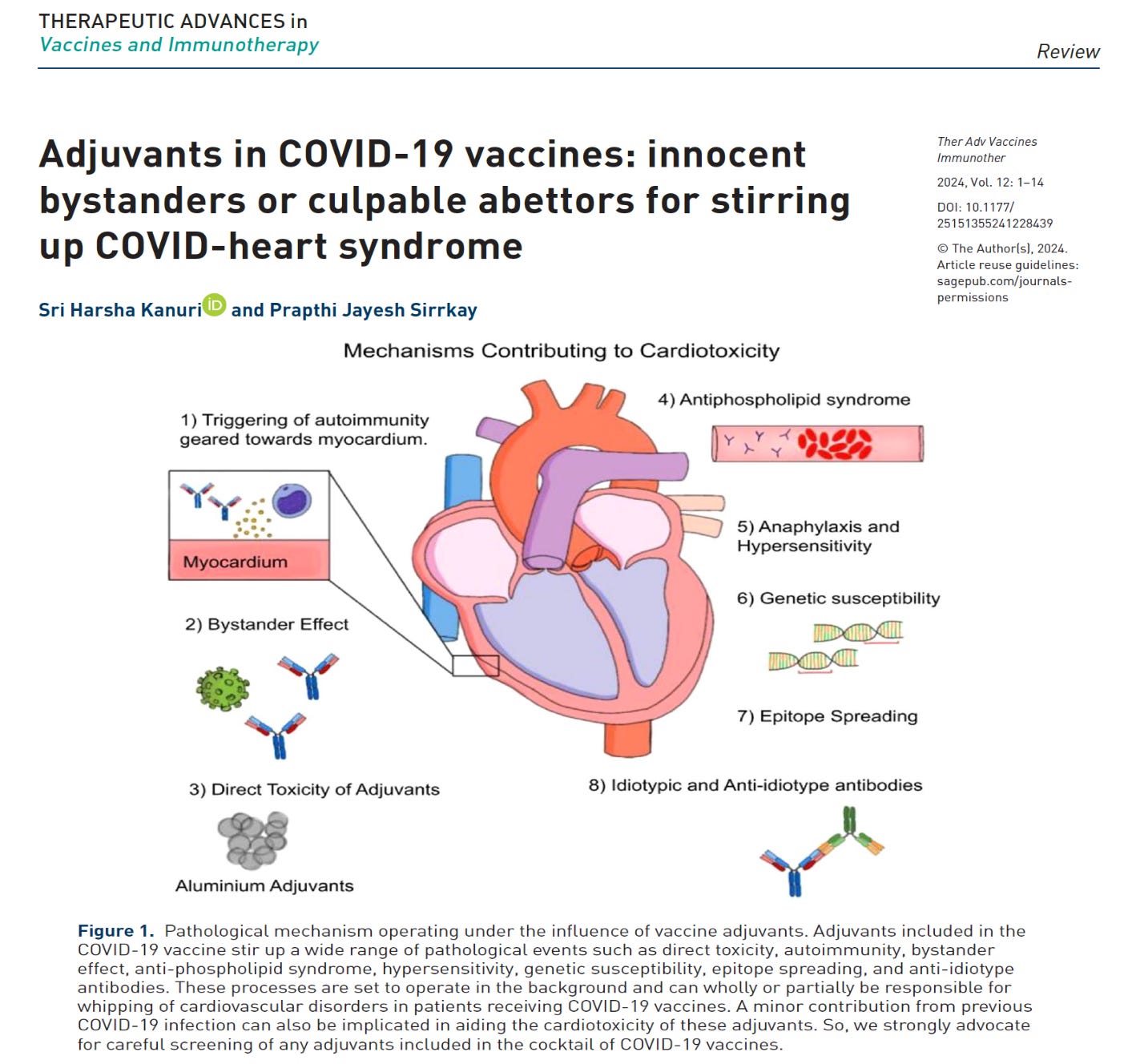Role of COVID-19 Vaccine Adjuvants in Cardiotoxicity
Causes of Heart Damage May Go Beyond mRNA and Spike Protein
By Peter A. McCullough, MD, MPH
I have been impressed with the broad array of cardiovascular syndromes arising after COVID-19 vaccination including acute cardiogenic shock, myopericarditis, dilated cardiomyopathy, heart block, atrial fibrillation, primary ventricular arrhythmias, acute hypertension, vascular dissection, aneurysmal rupture, dysautonomia, and nonspecific chest pain.
Kanuri and Sirrkay raise the possibility of many mechanisms explaining the broad array of cardiac complications and the varying times from injection to presentation. They consider genetic (mRNA adenoviral DNA), antigen, and killed virus vaccines. These are in addition to proven cardiotoxicity and myocarditis demonstrated with mRNA and Spike protein. While exhaustive ingredient lists have not been disclosed by the vaccine manufacturers, the authors speculate that adjuvants and their known mechanisms of cardiotoxicity may be at work:
“Types of vaccine adjuvants [possibly] used in COVID-19 vaccines. The adjuvants used in COVID-19 vaccines can be categorized into five classes namely Aluminum salt-based, Emulsion-based, TLR agonists, Metabolic, Cell death, and Epigenetic. 15,22 Each of these adjuvants instigate different mechanisms that are ultimately responsible for onset of spectrum of cardiovascular diseases seen in COVID-19 patients and those receiving vaccination (Figure 1). This review provides a brief overview of different mechanisms that can be arising out of these adjuvants, and each might be contributing at least partially to instigate cardiomyocyte damage.”

Thus the authors give us additional mechanisms to ponder as more patients come into clinics and hospitals with “COVID-19 vaccine heart syndrome” and the medical community comes to the unfortunate recognition that mass vaccination has created a whole new large population of cardiology patients.
Please subscribe to Courageous Discourse as a paying or founder member so we can continue to bring you the truth.
Peter A. McCullough, MD, MPH
President, McCullough Foundation





It takes a long time for a chronic disease to do you in, but an overreactive immune system can kill you within a few minutes. The authors admit that using adjuvants is a way to get a more robust adaptive immune response. In other words, they are injecting you with extra stuff to force the immune system to look at the thing that is in the shot, or the protein antigen that will be made from the mRNA in the shot. The goal is to get as many antibodies as they can, thinking that this will protect you from disease symptoms when you get infected. Admittedly, these serum antibodies do not protect a person from getting infected, they ADAPT or REACT to the infection. Unfortunately, as the authors point out, these antibodies can cause autoimmune reactions or activation of the complement system through various mechanisms, both of which are deadly.
The authors also point out that adjuvants can also be used to cause a better dendritic cell to T-cell response, hoping that these trained T-cells will get deployed to the epithelial barrier and be able to protect a person against infection. They admit the protection against infection is cellular, not involving serum antibodies. What the authors fail to mention is the fact that by doing this, the T-cells will be focused on looking for what was injected, not what is coming through the epithelial barrier. Therefore, infections will continue to occur as natural mutations occur, and viruses associated with other communicable diseases will get through as well.
Science has got to stop playing God by tricking the immune system. Let’s refocus on building up the protective mechanisms in natural ways, and treat infections when they happen.
and not just COVID 19 vaccinations. Adjuvants are widely used in many vaccinations especially for older populations.